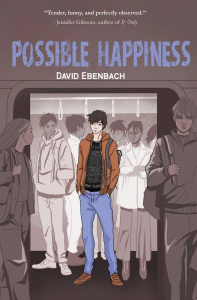

Photo of David Ebenbach by Justin Gellerson
Reviewed By Mary Miller
In 1989, junior year, Jacob Wasserman would be transformed from a quiet, shy, and, in his own estimation, “two-dimensional” loner to a member of The Pack. In the fluid manner of teenage relationships, a well-timed joke leads to a new friendship, which leads to a last-minute party invitation, which ultimately engenders the formation of a friend group that will become the focus of Jacob’s life, along with the inevitable group drama, romantic entanglements and jealousies, competition, and power struggles. Unspoken roles and responsibilities are fluid, and change quickly and often without a clear cause or purpose. The one nonnegotiable is loyalty to the group. Jacob, with a fractured family and limited social experience, is particularly in need of and vulnerable to the kind of togetherness The Pack implies.
The Pack is solidified, and complicated, through before-school hangouts, marathon evening telephone calls, parties thrown and attended, and nights on the dance floor at the iconic alternative/punk club Revival, whose siren song drew hordes of Gen X teenagers and young adults to the city in the late 1980s and early 1990s, and which provided a venue for all the drama, angst, and, as Ebenbach aptly describes in a running theme throughout his novel, the happy/angry joy/rage embodied in much of the music of that time.
His increasing enmeshment in The Pack leads to challenges for Jacob. He wants to maintain his pre-Pack work friendships, but is not sure how to do so. He is drawn to one girl in The Pack, but so are others—including his closest friend. The economic differences between Pack members are stark. Inevitably, the Pack members pair up into couples, either by desire or default, threatening the integrity of their bond. At the same time, Jacob needs to navigate his pre-Pack world, which is marked by complex family relationships, self-doubt, and debilitating anxiety. Belonging to The Pack, and having his first serious girlfriend within its confines, sometimes felt healing, yet sometimes led to new struggles that awakened Jacob’s anxiety, when he “would feel a keen howl of loneliness; or he would walk down his street and suddenly wonder whether he belonged there; or he would just wake up feeling a sense of being disconnected from the world.”
In Possible Happiness, Ebenbach provides a visit back to the high-school years, and for those of us who were Philadelphia-area teenagers in the late 1980s or early 1990s, reading this book is like stepping into a time machine. It rings true. Younger readers, as well as older ones, will connect with the narrative as well. This insightful coming-of-age novel provides a timeless look at that strange era in all of our lives of inevitable change, when we try on personalities like clothing while we try to figure out what feels right as we decide who we are going to be, and our friendships define us more than do our families. The writing is honest; the characters feel like people we know, or knew.
There are few seasons of life as consequential and poignant as the high-school years. Life for a t teenager is full of confusion, marked by periods of clarity; sadness, punctuated by moments of joy; and isolation, highlighted by sporadic episodes of belonging. Not only the inner demons unleashed during this time, but also myriad outer forces, define these years: imperfect families, social minefields, treacherous high-school halls. The friends made in those years shape us and reveal us; they change us, sometimes dramatically, sometimes rapidly. Despite widely varying experiences, locales, and encounters, there is one universal: the high-school years, and those with whom we spend them, are transformative.
In a recurring theme, Jacob has always wondered what lies at Fern Rock station. He has never taken the train that far, but he has always wondered, with such a bucolic name, what would be at the end of that train line: an actual rock blanketed by ferns? More city? Something else? Yet in the end, how much does it matter? As with this point in time in Jacob’s life—an unfinished time of evolution and change, during which “he couldn’t help feeling that he was still very much getting to know himself, and that there was probably a lot more to come”—the mystery may be an inextricable element of its essence.

Mary Evangelisto Miller (left) is a freelance writer and editor based in Bucks County. She has been self-employed as a medical editor for 22 years. Mary holds a bachelor’s degree in Mass Communications and English from Temple University and a master’s degree in English and Publishing from Rosemont College.